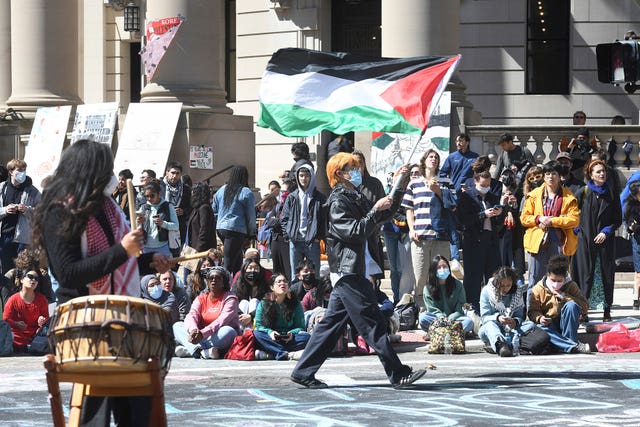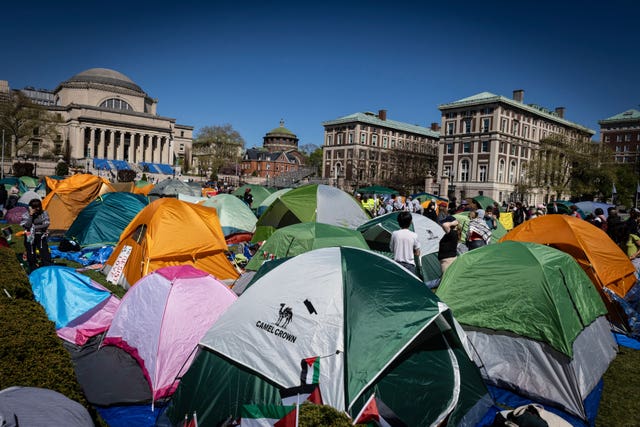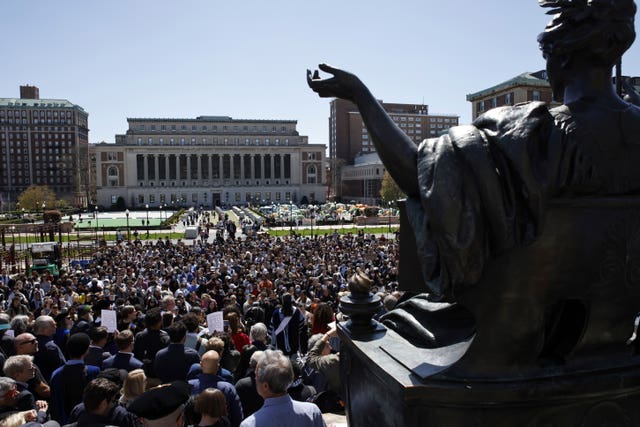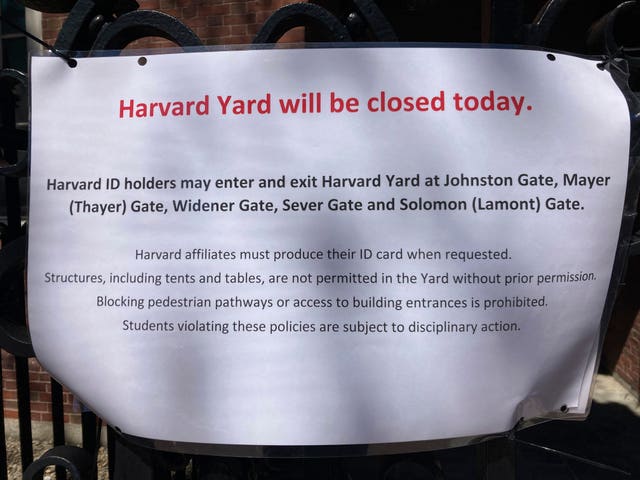
Columbia cancelled in-person classes, dozens of protesters were arrested at New York University and Yale, and the gates to Harvard Yard were closed to the public as some of the most prestigious US universities sought to defuse campus tensions over Israel’s war with Hamas.
More than 100 pro-Palestinian demonstrators who had camped out on Columbia’s green were arrested last week, and similar encampments have sprouted up at universities around the country.
At New York University, an encampment set up by students swelled to hundreds of protesters throughout the day on Monday.

The university said it had warned the crowd to leave, then called in the police after the scene became disorderly and the university said it learned of reports of “intimidating chants and several antisemitic incidents”. Police began making arrests shortly after 8.30pm.
“It’s a really outrageous crackdown by the university to allow the police to arrest students on our own campus,” New York University law student Byul Yoon said.
“Antisemitism is never OK. That’s absolutely not what we stand for and that’s why there are so many Jewish comrades that are here with us today,” the student said.
Universities are wrestling with where to draw the line between allowing free expression while maintaining safe and inclusive campuses.

The protests have pitted students against one another, with pro-Palestinian students demanding that their schools condemn Israel’s assault on Gaza and divest from companies that sell weapons to Israel.
Meanwhile, some Jewish students say much of the criticism of Israel has veered into antisemitism and made them feel unsafe, and they point out that Hamas is still holding hostages taken during the group’s October 7 attack.
Tensions remained high at Columbia, where the campus gates were locked to anyone without a school ID and where protests broke out both on campus and outside.
US Representative Kathy Manning, a Democrat from North Carolina who was visiting Columbia with three other Jewish members of Congress, told reporters after meeting with students from the Jewish Law Students Association that there was “an enormous encampment of people” who had taken up about a third of the green.

“We saw signs indicating that Israel should be destroyed,” she said after leaving the Morningside Heights campus.
Columbia announced on Monday that courses at the Morningside campus would offer virtual options for students where possible, citing safety as their top priority.
University president Minouche Shafik said in a message to the school community that she was “deeply saddened” by what was happening on campus.
“To de-escalate the rancor and give us all a chance to consider next steps, I am announcing that all classes will be held virtually on Monday,” Ms Shafik wrote, noting that students who did not live on campus should stay away.
Protests have taken place across many college campuses since Hamas’ deadly attack on southern Israel, when militants killed about 1,200 people, most of them civilians, and took roughly 250 hostages.

During the ensuing war, Israel has killed more than 34,000 Palestinians in the Gaza Strip, according to the local health ministry, which does not distinguish between combatants and non-combatants but says at least two-thirds of the dead are children and women.
In Massachusetts, a sign said Harvard Yard was closed to the public on Monday. It said structures, including tents and tables, were only allowed into the yard with prior permission. “Students violating these policies are subject to disciplinary action,” the sign said.
The same day, the Harvard Undergraduate Palestine Solidarity Committee said the university’s administration had suspended their group.
At Yale, in Connecticut, police officers arrested about 45 protesters and charged them with misdemeanor trespassing, a New Haven police spokesperson said. All were being released on promises to appear in court later, he said.


Comments: Our rules
We want our comments to be a lively and valuable part of our community - a place where readers can debate and engage with the most important local issues. The ability to comment on our stories is a privilege, not a right, however, and that privilege may be withdrawn if it is abused or misused.
Please report any comments that break our rules.
Read the rules hereLast Updated:
Report this comment Cancel